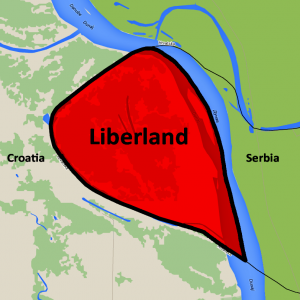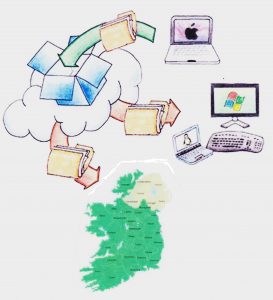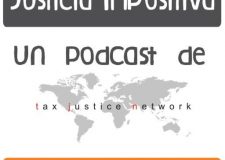Greetings from Liberland!
This week’s Offshore Wrapper comes to you from Liberland, the world’s newest tax haven.
The small country has been created on the banks of the Danube to provide much needed freedom from the tax hell many people find themselves in.
Currently just a 7 sq km piece of land in disputed territory between Croatia and Serbia, Liberland has no infrastructure, education facilities, healthcare system or even buildings, roads or electricity (quite easy to be a tax haven when you don’t need to pay for anything).
The mad-cap idea to set up a new tax haven comes from Czech politician Vít Jedli?ka, a self proclaimed libertarian. The slogan of Liberland is “live and let live”. Funding for Liberland will be though ‘voluntary taxation’.
The country has a website and potential citizens of this new country can discuss its future on a web forum.
We at the Tax Justice Network are frequently told there are many, many perfectly legitimate reasons tax havens exist. Perhaps the liberland.org forum can give us some insight.
Current discussions include whether the country should allow everyone to have guns, whether public nudity should be tolerated, whether paedophilia should be allowed, as well as other really important global political issues such as, “anyone else get really horny whilst watching Oprah”.
The Croatian government are less than impressed that a maverick Czech politician has decided to invite all the nutters of the world to join him in this misadventure. Especially when it is happening in territory which they claim to be their own. Just over a week ago they arrested Vit for trespassing. Then they arrested him again a few days later when trying to get to his new ‘country’.
Shady Arabia
Richard Brooks, investigative journalist working for Private Eye, has for several years been following a dodgy deal between the UK Ministry of Defence and Saudi Arabia.
The deal dates back to 1978 when the UK government signed a Memorandum of Understanding to provide communications equipment to the Saudi military. The deal continues today. In 2011 it emerged that a number of suspicious payments were being made by UK contractors involved in the deal to Cayman Islands companies.
The payments are being investigated by the Serious Fraud Office and it is suspected that these payments may be connected to bribes.
A Minute of a meeting from the Ministry of Defence describes ‘technical fees’ (of up to 15% of the contract) being paid as part of the contract. This Minute goes on to say “In neither the SADAP nor the SANGCOM case do I consider that the fees being demanded are exceptionally large in terms of the percentage commonly charged in Saudi Arabia for the sort of service being offered, which, although described as ‘technical consultancy’, amounts is practice to the exertion of influence to sway decisions in favour of the client.”
Dogged Brooks has been continuing to pursue the story and has even gone as far as launching a court case in order to get documents from the Ministry of Defence that reveal who signed off on these payments.
More power to your elbow, sir.
Was the Brazil football team sold to a Cayman company?
A huge story coming out of Brazil yesterday. Allegations were published in a Brazilian newspaper that the former President of the Brazilian Football Federation, Ricardo Teixeira, was bribed so that he would sell the right to select the Brazilian football team to third party marketing companies.
The revelations were published in Estadao and appear to have come out as a result of a power struggle within the federation.
According to documents revealed by the newspaper Teixeira along with his father in law, Joao Havelange, the former President of FIFA, were paid $40m to allow an anonymous company based in the Cayman Islands to select the Brazilian team (for more on Havelange’s history of corruption see this interview with Andrew Jennings).
One reason why the Caymans were used appears to be because of the secrecy the small island jurisdiction allows companies to get away with. For obvious reasons, no one was supposed to find out about this deal. Whoops!
The scam is alleged to have worked like this: players were selected on the basis of their marketing value and not their current form. Penalties were paid by the Brazilian Football Federation if less high profile players were selected over more well known figures.
There have long been rumours of bribes being paid so that less skilled players would be capped for the national team – and their transfer value inflated accordingly. But nothing this sensational has ever been alleged.
Most successful footballing nations, Germany for example, select their teams based on talent, skill, form, fitness, tactics and a number of other metrics assessed by professionals with years of experience in order to try and get the best result.
Perhaps this difference in approach is one reason why things like this happen:
A version of this story appeared on the TJN’s Offshore Game website
Cry for me Argentina
Banks are secretly conspiring to help citizens evade taxes. That is one of the more inflammatory allegations to come out of the commission to examine HSBC’s role in facilitating tax evasion in Argentina.
The allegation has been made by a former Vice President of JP Morgan, Hernan Arbizu, although there are questions as to why he is giving this testimony.
Hernan is wanted in the United States where JP Morgan have accused him of fraud for forging a client’s signature. He agreed to give testimony to the commission in order to avoid extradition. After being accused of fraud he handed the Argentine authorities a list of clients at banks he used to work for that he says have undeclared assets abroad.
In total Hernan says that Argentinians have $400bn stashed abroad and despite question marks over his motivation, the figures he has put forward seem plausible. HSBC were accused of having $3.5bn from Argentine sources stashed in Switzerland – and HSBC only manage a small proportion of the assets in the country.
Tax Avoidance – I’m Loving it
European trade unions have alleged that McDonalds is avoiding potentially billions in taxes though royalty payments to a Luxembourg company.
Unions claim that a subsidiary of the company based in Luxembourg made revenues of €834m despite the fact that it had just 13 employees.
The European Commission has said it will look into the claims. This comes at a time when the Commission has already opened investigations into Fiat, Starbucks, Amazon and Apple.
But what progress will the Commission make? The EU Observer reports that the current investigations have already run into difficulties with some member states being a bit slow providing information to the commission. What are they hiding?
Another Swiss List?
Prepare for more Swissleak style bombshells if the news coming out of Israel is true. Moshe Asher, the head of the Israeli Tax Office told Globes in February of this year that lists of secret bank accounts like the HSBC list would only proliferate.
In the same interview he made reference to a list of UBS clients held by the Israeli Tax Office which was acquired though an intelligence operation.
Now Moshe claims to have another list of clients from another bank in Switzerland. Where the Israelis are getting these lists from who knows? But if they are a sign of more whistleblowers coming forward, the financial sector should be prepared for even more trouble over the coming months.
Taxes – just put them in my (Irish) dropbox
Users of dropbox may have noticed an email recently from the company saying that it was updating its terms of service for people outside the United States.
No matter where in the world you are based, if you use dropbox, you will now be billed from Ireland. Presumably this has everything to do with the greater efficiency of billing staff in Ireland, and nothing to do with the transfer pricing shenanigans that Ireland specialises in.









Leave a Reply